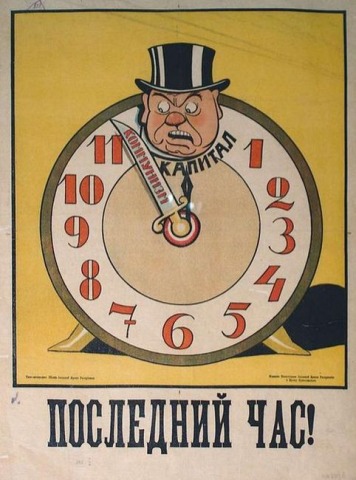
The Underground Thomist
Blog
Gospel SocialismMonday, 01-26-2026
One grows so weary of socialism being touted as the meaning of the Gospel. We see this in the secular world, of course. But we also see it in liberal Protestantism, and in certain Catholic circles too. This is especially awful because it is, in the literal sense, a heresy. It isn’t compassionate, and it has nothing to do with the Gospel. “Nothing to do with it? How can you say that?” To answer the question with a question: Can you tell me where the Gospel says it is wrong for anyone to have more or less than another? You can’t. The Gospel praises generosity and warns against the love of money, but what it condemns isn’t inequality of wealth per se, but exploiting and neglecting the poor – “the widow and the orphan,” who have no one to provide for them. Much of what government does today in the name of caring for the poor actually hurts them, but that is a story for another day. I was talking about inequality. The common assumption is that the poor are poor because other people are rich. Therefore, if no one was rich, no one would be poor. For example, a recent article in the Vatican newspaper L’Osservatore Romano laments that the wealth of those it considers super-rich “would be enough to eliminate extreme poverty in the world 26 times.” In case you’re wondering, that article is what lit the fuse for this post. Never mind whether the statistic is accurate. Does the author really suppose that simply transferring money from haves to have-nots will eliminate poverty? And does he really suppose that the poor in poor countries are the ones who would get the transferred money? How tempting to think so. It would be so easy! Just take it away from the rich people and give it all away! And since most of us aren’t rich (I’m not), thinking so makes us feel wonderful. But it’s false. If the rich use their wealth in a way that promotes economic development, then by doing so they help the poor. Needless to say, they might not use their wealth in that way, but in a capitalist economy, it is in their interest to do so. On the other hand, if the poor remain untrained and uneducated, with unstable marriages and family structures, without opportunities and incentives for employment, they will remain poor no matter how much money they are given. Moreover, if the governments of the poor countries fail to enforce the rule of law and operate as kleptocracies, whatever money you transfer to them will go to their kleptocrats, not to their poor. If you want to help the poor, here or abroad, help them overcome those burdens. I am unpleasantly reminded of a minister in Appalachia whom I heard railing against “global capitalism” as the cause of poverty, but had nothing at all to say about finishing school, working whenever possible, not using drugs, and not having children until getting married. Thank God he wasn’t typical. Doing those things wouldn’t end all poverty – remember the widow and the orphan! -- but it would end, or ameliorate, a lot of it. Do you think I am being mean? We need to rethink what it is to be mean. Suppose we take away all the wealth of a man who has started a business and built a factory paying good wages to 500 people, and we simply transfer all that money to low-income people. The poor who get the money will live well for a day, but the structural reasons for their poverty will be untouched. In the meantime, 500 hard-working people will be thrown out of their jobs. Who is being mean now? Yes, the starving man needs a meal. Feed him. But if you think he needs only a meal, you are a lazy thinker, self-serving, and desperately wrong. You are making yourself feel good about the poor on the backs of the poor. I am also weary, so weary, of seeing the look in the eyes of young men who see a job as just a temporary way to earn enough money to buy the next fix – who work for a few days or weeks, get stoned, and never show up again. And please don’t think I hear about such young men only from books. I am on first-name terms with some of them. I know their mamas. I also know some young men who by the grace of God broke out of that trap, got married, work every day, and are gradually building lives for their families. What is the real problem with inequality as such? None. Ask instead what is the real problem with extreme wealth. Very well, what is the problem with extreme wealth? Now comes the pivot, for there really are two problems with it. Not the ones you think. The first problem is that it risks grave spiritual harm to the rich person himself. He easily comes to think too well of himself, failing to recognize how he is needy before God. A genuinely poor person bears many burdens, but at least he is not exposed to that temptation. Blessed are the poor in spirit, for theirs is the kingdom of Heaven. The second problem is that extreme wealth buys great political influence, and no economic system has built-in incentives for political influence to be used for the common good. I mentioned that under capitalism, it is in the rich man’s material interest to use his wealth in a way that promotes economic development, because doing so profits him too. But unfortunately, it is also in his material interest to use it in a way that gains him privileges, subsidies, and other advantages from the government, at the expense of everyone else. Even Adam Smith, the famous proponent of the “invisible hand,” warned sternly against that. In fact, it is simply untrue that big business today exerts influence in favor of capitalism. If capitalism means free markets, it has been quite a long time since most capitalists believed in capitalism, which is why Wall Street is now more generally allied with the political Left. What we call capitalism today is more like socialism with outsourcing. Yet how naïve to think that unmixed, out-and-out socialism would cure that problem. In fact it would only replace a merely-influential big business class with a nearly-omnipotent bureaucratic and political class. Under the present system, big business must contend with the countervailing influence of many other social groups, and that’s good. Under socialism, though, the bureaucratic and political class would have the power to crush all competition. This has been tried. It hasn’t worked out well. Under socialism we are all equal. Equally poor.
|
Soapy WokeMonday, 01-19-2026
The determination of woke corporations to push their opinions in the faces of ordinary folks who don’t share them is just a part of a broader contempt for customers and clients who aren’t enough like the people in the executive suites. It’s a political thing, sure, but it’s even more a social class thing. They’re snobs. Cracker Barrel execs didn’t plaster their restaurants with BLM posters and LGBTQ flags, but even so they wanted Cracker Barrel to be the sort of restaurant in which they would like to eat, not the sort which their customers enjoy. Hollywood producers would rather make movies they would like to see, than the sort that moviegoing people want to. I'm sure that Bud Light execs were glad of their brand’s popularity, but they didn’t like the "fratty" people who bought it. Since I don’t watch daytime soap operas myself, it was a surprise to me to learn recently that this contemptuous attitude is in evidence even there. A woman I know who used to be fond of soaps explained to me that the traditional family crises and personal entanglements she loved seeing play out on the screen are vanishing from the shows she used to enjoy. Now, she lamented, everything in the plots is about business conspiracies and corporate backstabbing. “All these characters think about is their jobs.” Considering that soaps are watched mostly by women who may or may not work outside the home, but who care about other things more than their jobs if they do have them, it’s not surprising that the audience for soaps is shrinking. The writers – more likely, the people in the executive suites who give the writers their instructions – still want ratings, I suppose, but even more important to them is that the shows reflect their own preoccupations.
|
Like a Seed or SignetMonday, 01-12-2026
The classical writers often speak of laws being “impressed” into something or someone by some divine or human agent, as a seed is impressed into soil or the shape of the signet is impressed into wax. I think it is worthwhile to consider the various kinds of soils or waxes they had in mind. I am using the term “laws” broadly, not only for laws in the strict sense, addressed to rational beings, such as “Thou shalt not murder,” but also for patterns which are merely analogous to laws, such as the so called law of gravity. In either sense, laws are impressed -- Into inanimate things. Rocks fall to earth. Acorns aim at becoming oaks. They can’t help it. Into the nature of the passions. Although we can resist excessive passion or stir up deficient passion, we cannot change what the passions are in their very nature. However misguided our perceptions may be, we become angry only to protect perceived good against perceived bad, never the reverse. A dog growls when you take away his bone, not when you give him one. Into latent knowledge. Even before we are old enough to grasp abstractions, if mother asks us “How you you feel if she pinched you?”, we may grasp her point. Into developed knowledge. That seed of knowledge grows, as all seeds do, so that eventually we do come to understand such things as the Golden Rule. Into actual knowledge. It is one thing to know a rule, another to keep it in awareness. Into effective knowledge, which is also called wisdom. It is one thing to keep a rule in awareness, still another to grasp how to apply it. Into innate habit. An infant will often take the teething biscuit out of his mouth and offer it to those watching, just because the giving impulse strikes him. This habit is not true generosity, but it can be shaped and trained. Into acquired habit. Even if we are fearful, if we resist our fear often enough, the act may become habitual. A person with such a habit is called brave. Into acquired virtue. We must take into ourselves what to be brave about, how brave to be, on what occasions, toward what people, and for what reasons. A person with such a habit is properly called not merely brave but courageous. Into infused virtue. Through cooperation with the grace of God, our ordinary virtues may be healed and uplifted to heights we cannot attain by ourselves. Consider the martyrs. Into habitually infused virtue. Through the habit of cooperation with grace, we may acquire a sort of habit of receiving it. Contrast a person rowing against a strong current with a person with the wind in his sails.
|
New Interview about my New BookMonday, 01-05-2026
My dear readers, (Doesn’t that salutation make me sound like a Nigerian prince? But then I would have said dearest.) My new book Pandemic of Lunacy: How to Think Clearly When Everyone Around You Seems Crazy is coming out on February 3. Right after Christmas, I was interviewed about it by Tom Loarie of TheMentorsRadio.com. His popular podcast deals with all sorts of things at the intersection of life and work, featuring conversations with CEO and other prominent figures in the business world – with a few exceptions like me, of course. He had a lot of thoughtful questions, and I think you’ll find the interview interesting. We talked less about the content of the book than about what prompted me to write it. Something strange is happening to us: Why does our society seem to be going crazy? (As another reader remarked to me: “Why do you say seems to?) You can find the interview linked on my Talks Page, if you would rather go straight to the audio you can do that too, and if you would like to find out more about Tom Loarie’s podcast series, you can go his own website, TheMentorsRadio.com.
|
Chesterton on the Object of a New YearWednesday, 12-31-2025
“New Years and such things are extraordinarily valuable. They are arbitrary divisions of time; they are a sudden and ceaseless cutting in two of time. But when we have an endless serpent in front of us, what can we do but cut it in two? Time is apparently endless and it is beyond all question a serpent. The real reason why times and seasons and feasts and anniversaries arose is because this serpent of time would otherwise drag his slow length along over all our impressions, and there would be no opportunity of sharply realizing the change from one impression to another …. It would be good if we expected a bell to ring towards the end of a sunset. It would be good if we thought the clock might strike while we were in the perfect pleasure of staring at sea and sky. Such a sudden check would bring all our impressions into an intense and enjoyable compass, would make the vast sky a single sapphire, the vast sea a single emerald. After long experience of the glories of sensation men find that it is necessary to put to our feelings this perfect artistic limit. And after a little longer experience they find that the God in whom they hardly believe has, as the perfect artist, put the perfect artistic limit – death. “Death is a time limit; but differs in many ways from New Year’s Day. The divisions of time which men have adopted are in a sort of way a mild mortality. When we see the Old Year out, we do what many eminent men have done, and what all men desire to do; we die temporarily. Whenever we admit that it is Tuesday we fulfil St. Paul, and die daily. I doubt if the strongest stoic that ever existed on earth could endure the idea of a Tuesday following on a Tuesday, and a Tuesday on that, and a Tuesday on that, and all the days being Tuesdays till the Day of Judgment, which might be (by some strange and special mercy) a Wednesday. The divisions of time are arranged so that we may have a start or shock at each reopening of the question. “The object of a New Year is not that we should have new year. It is that we should have a new soul and a new nose; new feet, a new backbone, new ears, and new eyes. It is that we should look out instantaneously on an impossible earth; that we should think it very odd that grass should be green instead of being reasonably purple; that we should think it almost unintelligible that a lot of straight trees should grow out of the round world instead of a lot of round worlds growing out of the straight trees. The object of the cold and hard definitions of time is almost exactly the same as those of the cold and hard definitions of theology; it is to wake people up. Unless a particular man made New Year resolutions, he would make no resolutions. Unless a man starts afresh about things, he will certainly do nothing effective. Unless a man starts on the strange assumption that he has never existed before, it is quite certain that he will never exist afterwards. Unless a man be born again, he shall by no means enter into the Kingdom of Heaven. “.… Man has, as I have urged in the case of religion, perceived with a tolerable accuracy his own needs. He has seen that we tend to tire of the most eternal splendours, and that a mark on our calendar, or a crash of bells at midnight maybe, reminds us that we have only recently been created. Let us make New Year resolutions, but not only resolutions to be good. Also resolutions to notice that we have feet, and thank them (with a courtly bow) for carrying us.” — G.K. Chesterton, Daily News (01-01-1904)
|
The Seal of DivinityWednesday, 12-24-2025
This Christmas night bestowed peace on the whole world; So let no one threaten;
This is the night of the Most Gentle One - Let no one be cruel;
This is the night of the Humble One - Let no one be proud.
Now is the day of joy - Let us not revenge;
Now is the day of Good Will - Let us not be mean.
In this Day of Peace - Let us not be conquered by anger.
Today the Bountiful impoverished Himself for our sake; So, rich one, invite the poor to your table.
Today we receive a Gift for which we did not ask; So let us give alms to those who implore and beg us.
This present Day cast open the heavenly doors to our prayers; Let us open our door to those who ask our forgiveness.
Today the Divine Being took upon Himself the seal of our humanity, In order for humanity to be decorated by the Seal of Divinity.
-- From a Christmas sermon by St. Isaac the Syrian
|
What Forgiveness Is NotMonday, 12-22-2025
In a famous incident in the gospels, Peter asked Jesus, “Lord, how often shall my brother sin against me, and I forgive him? As many as seven times?” Jesus replies, “I do not say to you seven times, but seventy times seven.” Some writers say this means that our forgiveness must be unlimited, as God’s is unlimited, and that we must not keep track. The common saying is “forgive and forget.” But this view blurs a number of distinctions. In the first place, God’s forgiveness is limited in certain ways. In this sense it really has no limit: There is no repented sin too great for Him to forgive. He lays Himself across the chasm. But in this sense it does have a limit: He will not forgive known, grave sin which I obstinately refuse to repent; refusal to repent is precisely refusal of forgiveness, refusal that the chasm be crossed. In the second place, God does keep track in certain ways. In this sense He really doesn’t keep track: When He forgives me, He forgives me completely, and is willing for me to be entirely reconciled to Him, setting my forgiven sins as far from Him as the east is from the west. But in this sense He does keep track: If I sin and repent, sin and repent, in an endless cycle of wrong and remorse, then even though He forgives me, He is not satisfied. In His inexorable love, He will not settle for cleansing my guilt but leaving all my sinful tendencies intact. He demands that I submit to His surgery. Besides, God does not desire that we be hurt. Suppose my brother has wronged me seventy times seven times, and then repented seventy times seven times. Yes, I must forgive him seventy times seven times -- but I am not required to expose myself to further harm seventy times seven times. Must a battered wife continue living in the same household as her violent husband? Does forgiveness require not wanting the wrongdoer not be punished? No, that would not even be kind to the wrongdoer, because justice is medicinal. Does it require acting as though reconciliation has taken place, even though it hasn’t? No, that would leave us vulnerable to those still likely to hurt us. Does it require indifference to whether the wrongdoer repents? No. Concerning those who nailed Him to the Cross, Jesus did not pray, “Father, forgive them, because they need not be sorry for their sins,” but “Father, forgive them, because they know not what they do.” Speaking for myself, when I do wrong, I usually know very well what I do. Then what does forgiveness require? It requires that I let go of bitterness, setting aside the desire to hurt back, trusting in God’s justice. It requires that I hope for the wrongdoer’s change of heart, trusting in His grace. It requires a desire for ultimate reconciliation with the wrongdoer, even while realizing that this may not be possible in the present life. And it requires that I remember the mercy that I myself have received, for I have greatly sinned.
|






